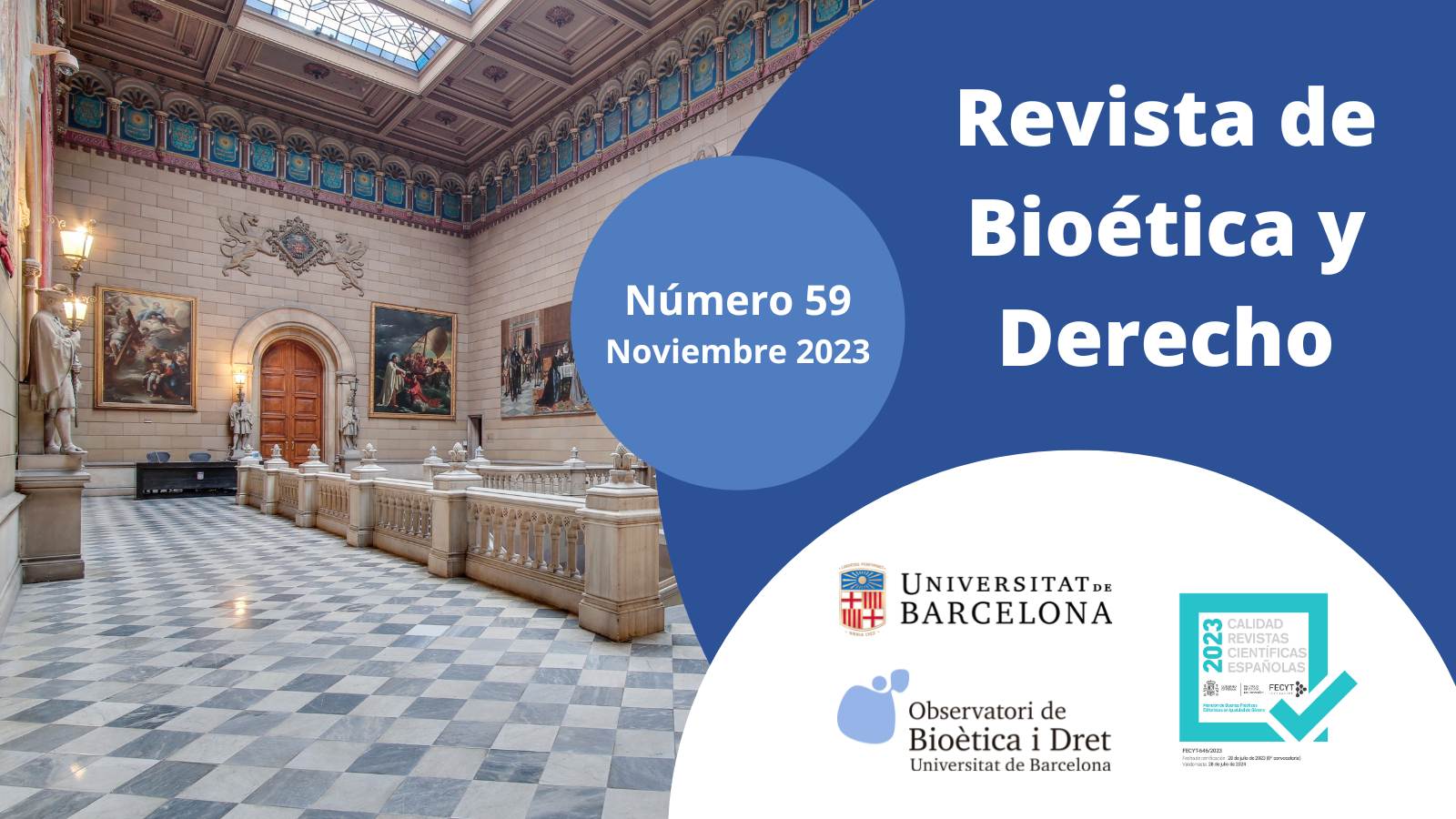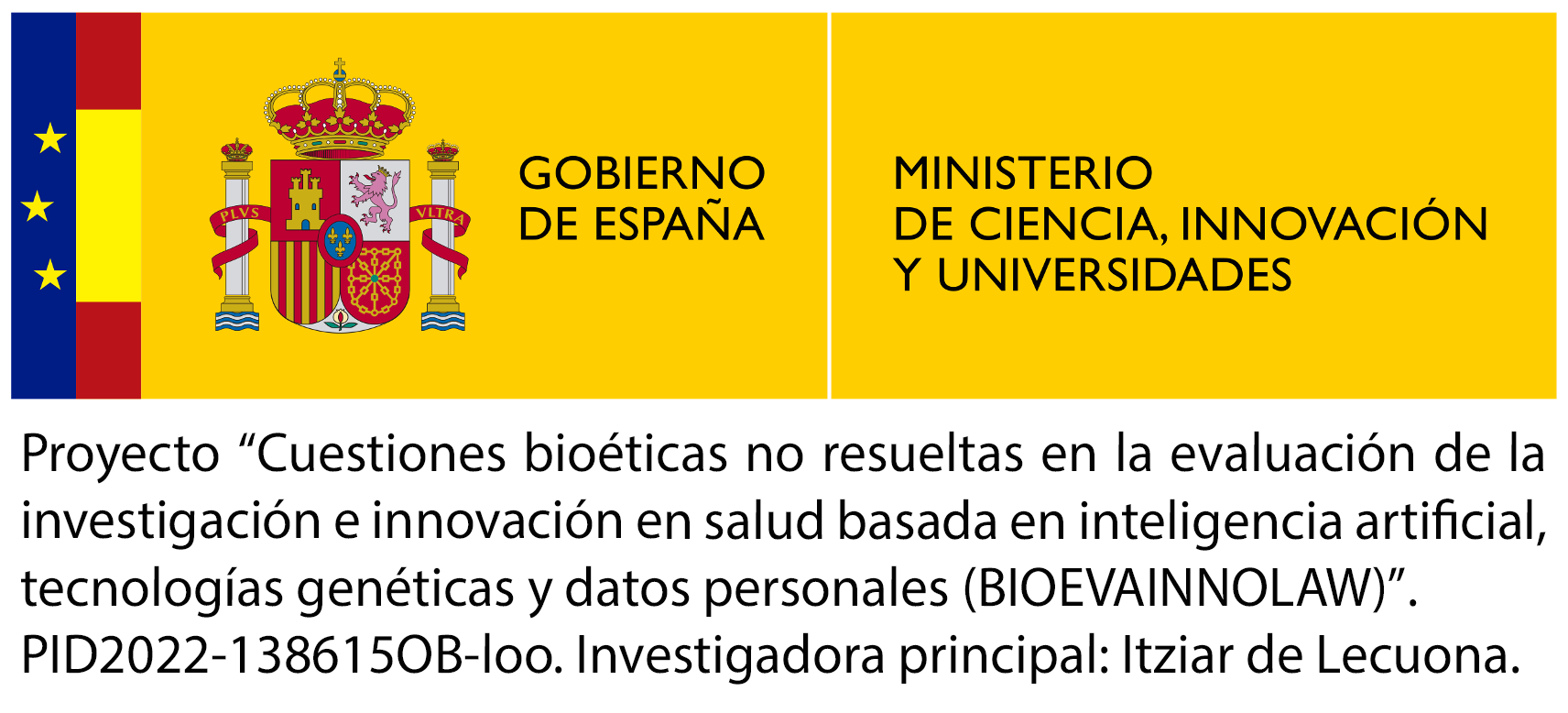Public health in Ecuador: Mandatory vaccination against COVID-19 and vaccine certificate
DOI:
https://doi.org/10.1344/rbd2023.59.39744Keywords:
compulsory vaccination, COVID-19 vaccine certificate, bioethical principles, syndemic model, determinants of health, biosocial complexAbstract
The compulsory COVID-19 vaccine and the requirement of the certificate in Ecuador constitute policies that depend on the governability and governance of the central power, which drags political, socioeconomic, legal, environmental, health, and sanitation crises from previous administrations and its own. Policies framed in a paternalistic health model, which is justified in the case of the mandatory vaccine, by the risk and damage of SARS-Cov2, which forced autonomy into the social order, and which have generated debate. There is a 7.8% of the population dissenting to the vaccine for epistemic reasons of lack of knowledge of its functioning, and ethical-political reasons such as individual freedom, religion, thought, and the scope of State`s power. Statistics show that most of the people hesitant to immunization are historically discriminated collective subjects such as Afro-Ecuadorians, and Montubio indigenous people. Most of them belong to the lower social class, and live in the periphery, which prior to the pandemic, lacked health infrastructure. Demonstrating how the determinants of health influence and combine in a diverse biosocial complex, creating vulnerabilities and privileges. The pandemic exposes the inequalities and problems of the paternalistic model of the National Health System. Therefore, through the dialectic method, the article analyzes the positions opposed to imperative immunization, and proposes a third one based on a syndemic model of health, which considers the biosocial complex, whose normative minimum are human rights, freedom, dignity, and bioethical principles, mainly vulnerability, interdependence, cultural diversity, pluralism, and social justice.
References
Ávila, R. (2011). El neoconstitucionalismo transformador (1 a Ed.). Quito: Universidad Andina Simón Bolívar.
Beauchamp, T. & Childress, J. (2019). Principles of Biomedical Ethics (8.a Ed.). Oxford: Oxford University Press.
Blauwet CA., Brashler R., Kirschner KL., Mukherjee D. (2020) Vulnerability, Interdependence, and Trust in the COVID-19 Pandemic. PM & R: the Journal of Injury, Function, and Rehabilitation. Oct;12(10):1038-1044. DOI: 10.1002/pmrj.12480. PMID: 32888396.
Caballero, H. Mojica, M. (2021). El derecho a la salud, el litigio y el aporte de la Corte Constitucional colombiana: una revisión sistemática de literatura. Interface, 28. 1-14. https://doi.org/10.1590/interface.200331.
Cabral, A. (2022). Resistance and Decolonization. Maryland: Rowman & Littlefield International.
_______ (2016). Resistance and Decolonization (Reinventing Critical Theory). Rowman & Littlefield Publishers. Edición de Kindle.
_______ (1974). Análise de Alguns Tipos de Resistência. Lisboa: Seara Nova.
Convenio No. 169. Organización Internacional del Trabajo (OIT).
Colombo, E. (2021). Human Rights-inspired Governmentality: COVID-19 through a Human Dignity Perspective. Critical Sociology, 47(4–5), 571–581. https://doi.org/10.1177/0896920520971846.
Córdova, L. (16 de agosto 2022). Se está legitimando la presencia cada vez más fuerte de policías y militares como los gestores de la política. https://wambra.ec/luis-cordova-violencia-relacionada-grupos-narcodelictivos-guayaquil/.
_______ (2022). ¿Hay una guerra del narco contra el Estado? En línea. Disponible en https://wambra.ec/luis-cordova-violencia-relacionada-grupos-narcodelictivos-guayaquil/ [Consulta 11 octubre 2022].
Chauca, R. (2021). La COVID-19 en Ecuador: fragilidad política y precariedad de la salud pública. Historia, ciencia, saude-manguihos. 28(2). 587-591. https://doi.org/10.1590/S0104-59702021005000003.
Díaz, F. (2017). Vulnerabilidad. La profundidad de un principio de la bioética. Perspectiva Teológica. 49. 155. 10.20911/21768757v49n1p155/2017. DOI:10.20911/21768757v49n1p155/2017.
Dib, F., Mayaud, P., Chauvin, P., & Launay, O. (2021). Online mis/disinformation and vaccine hesitancy in the era of COVID-19: Why we need an eHealth literacy revolution. Human vaccines & immunotherapeu-tics. 1-3. https://doi.org/10.1080/21645515.2021.1874218.
Doebrich, A, Quirici, M, and Lunsford, C. (2020). COVID-19 and the Need for Disability Conscious Medical Education, Training, and Practice. Journal of Pediatric Rehabilitation Medicine: An Interdisciplinary Approach. 13. 393 – 404. DOI: 10.3233/PRM-200763.
Dueñas-Castell, C. Celis-Rodríguez, E. Cárdenas-Bolívar, Y. Aguilar-Schotborgh, M, Ortiz-Ruiz, G. (2021). COVID-19: Faustos y Mefistófeles. Acta Colombiana de Cuidado Intensivo. 1-8. https://doi.org/10.1016/j.acci.2021.11.002.
Dukhanin, V., Searle, A., Zwerling, A., Dowdy, D.W., Taylor, H.A. y M.W. Merritt. (2018). Integrating social justice concerns into economic evaluation for healthcare and public health: A systematic review. Social Science & Medicine. 27-35. DOI: 10.1016/j.socscimed.2017.12.012.
Ecuador. Comité de Operaciones de Emergencia Nacional. (2021) Resoluciones 30 de noviembre. Disponible en https://www.pudeleco.com/clegal/varios/2021/coe096.pdf [Consulta 4 abril 2022].
_______ (2021) Resoluciones 21 de diciembre. Disponible en https://www.pudeleco.com/clegal/varios/2021/coe099.pdf [Consulta 4 abril 2022].
_______ (2022) Resoluciones 3 de enero https://www.pudeleco.com/clegal/varios/2022/coe101.pdf [Consulta 4 abril 2022].
Ecuador. Consejo Nacional para la igualdad de pueblos y nacionalidades. 2019. Agenda para la igualdad de derechos de nacionalidades y pueblos indígenas, afroecuatorianos y montubios. Disponible en http://www.pueblosynacionalidades.gob.ec/wp-content/uploads/2020/02/Agenda-Nacional-para-la-Igualdad-de-Pueblos-y-Nacionalidades.pdf [Consulta 10 abril 2022].
Ecuador. Constitución de la República. (2008) Registro Oficial 449 de 20-X-2008 y Registro Oficial 490, Suplemento, de 13-VII-2011.
Ecuador. Instituto Nacional de Estadística y Censos. (2019). Encuesta nacional de empleo, desempleo y subempleo (ENEMDU).
Indicadores de pobreza y desigualdad, p.1-28, 2019a. Disponible en: https://www.ecuadorencifras.gob.ec/documentos/web-inec/POBREZA/2019/Diciembre-2019/201912_PobrezayDesigualdad.pdf [Consulta 28 marzo 2022].
_______ (2021). Características de la población contagiada y no vacunada contra la COVID-19. Disponible en https://www.ecuadorencifras.gob.ec/documentos/web-inec/Vacunacion_COVID-19/2021_IV_Trimestre_vacunaci%C3%B3n.pdf.
_______ (2022). Registro estadístico de camas y egresos hospitalarios. Disponible en https://www.ecuadorencifras.gob.ec/documentos/web-inec/Estadisticas_Sociales/Camas_Egresos_Hospitalarios/Cam_Egre_Hos_2021/Presentacion_ECEH_2021.pdf.
Ecuador. Ministerio de Salud Pública. (2022). Situación epidemiológica nacional COVID-19 Ecuador. Disponible en https://www.salud.gob.ec/wp-content/uploads/2021/12/MSP_cvd19_infografia_diaria_20211231.pdf [Consulta 3 abril 2022].
_______ (2021). Declaratoria de obligatoriedad de vacunación contra COVID-19. Disponible en https://www.salud.gob.ec/ecuador-declara-obligatoriedad-vacunacion-contra-COVID-19/ [Consulta 3 abril 2022].
_______ (2021). Lineamiento de obligatoriedad de la vacunación contra SARS Cov-2. Disponible en https://www.salud.gob.ec/wp-content/uploads/2021/12/Lineamiento-obligatoriedad-vacuna-COVID-19.pdf [Consulta 5 de abril 2022].
_______ (2022). Informe epidemiológico de COVID-19 actualizado 26 de enero 2022. Disponible en https://www.salud.gob.ec/wp-content/uploads/2022/01/26-01-22-MSP-Sit-epidemiologica-COVID-ECU-UIO-GYE.pdf [Consulta 5 abril 2022].
_______ (2022). Vacunómetro COVID-19. Disponible en Microsoft Power BI [Consulta 5 abril 2022].
Ecuador. Reglamento a la Ley de Seguridad Pública y del Estado. (2010) [Consulta 10 octubre 2022].
Esposito, R. (2013). Comunidad, inmunidad y biopolítica. Barcelona: Herder.
Estévez, F. (2023). Demencia Bioética y derechos en el Ecuador. Cuenca: UIDE.
Evans, B. J. (2017). Power to the People: Data Citizens in the Age of Precision Medicine. Vanderbilt journal of entertainment and technology law, 19(2), 243–265. https://pubmed.ncbi.nlm.nih.gov/29118898/.
García López, F. (2023). Cuestiones éticas planteadas por los protocolos de exclusión. Apuntes del curso de Salud Pública. Master de Bioética y Derecho de la Universidad de Barcelona.
Gómez Ayala, D. A., & Páramo, P. (2022). La aceptación o rechazo a vacunarse contra el COVID 19: Revisión Sistemática desde las perspectivas culturales, psicológicas y educativas. Cuadernos Hispanoamericanos De Psicología, (2), 1–19. https://doi.org/10.18270/chps.v2021i2.3751.
Guerrero Salgado, EE, & Rodríguez Estévez, F. (2022). Constitucionalismo del desastre en Ecuador: conducta y sentencias estatales frente a la emergencia sanitaria del COVID-19. Estado & comunes, revista de políticas y problemas públicos, 1(14), 193-210. https://doi.org/10.37228/estado_comunes.v1.n14.2022.251.
Hannah, M.G., Hutta, J.S., & Schemann, C. (2020). Thinking through COVID-19 responses with Foucault: An initial overview. Corpus ID: 219665864 https://www.kulturgeo.uni-bayreuth.de/de/news/2020/Thinking-Corona-measures-with-Foucault/Thinking-Corona-measures-with-Foucault.pdf.
Johns Hopkins University & Medicine. (2022). Coronavirus Resource Center: Ecuador overview. Disponible en https://coronavirus.jhu.edu/region/ecuador [Consulta 5 abril 2022].
Lacsa, J. (2021) COVID-19 vaccine passports: A mandatory choice or a mere option? Journal of Public Health. https://doi.org/10.1093/pubmed/fdab258.
Lorenzini, D. (2021). Biopolitics in the Time of Coronavirus. Critical Inquiry, 40-45. https://doi.org/10.1086/711432.
Mendenhall, E., & Singer, M. (2020). What constitutes a syndemic? Methods, contexts, and framing from 2019. Current Opinion in HIV and AIDS, 15(4), 213-217. doi: 10.1097/COH.0000000000000628.
McAteer, J. Yildirim, I. Shahrud, A. for the Society for Pediatric Research Advocacy Committee. (2020). The VACCINES Act: Deciphering Vaccine Hesitancy in the Time of COVID-19, Clinical Infectious Diseases, 71. 703–705, https://doi.org/10.1093/cid/ciaa433.
Nussbaum, M. (2011). Creating capabilities: The human development approach. Harvard: Harvard University Press.
Orellana, C. (2017). La dignidad humana como eje central para el ejercicio del derecho a la salud. Derecho global estudios sobre derecho y justicia. 5, 139-166. https://doi.org/10.32870/dgedj.v0i5.76.
_______ (2018). Consentimiento informado en la prestación de servicios de salud. Derecho global estudios sobre derecho y justicia. 9. 57-80. https://doi.org/10.32870/dgedj.v0i9.166.
Organización Mundial de la Salud. (2021). Inmunidad colectiva, confinamientos y COVID. Disponible en https://www.who.int/es/news-room/questions-and-answers/item/herd-immunity-lockdowns-and-COVID-19 [ Consulta 6 de abril 2022].
Orrantia, R. (2022). COVID-19 y Justicia Social. Un enfoque sindémico de la resistencia a la vacunación. RBD. Revista de Bioética y Derecho. 54. 23-46. https://doi.org/10.1344/rbd2021.54.37533.
Oxford Committee for Famine Relief [Oxfam] (16 de enero de 2021). El virus de la desigualdad. [Consulta 15 de octubre 2022].
Plan V. (2020). La corrupción hospitalaria acorrala al gobierno. Disponible en https://www.planv.com.ec/historias/sociedad/la-corrupcion-hospitalaria-acorrala-al-gobierno. [Consulta 28 marzo 2022].
Quintero, S. (2018). Bioética hermenéutica: una revisión crítica del enfoque principalista. Bajo palabra revista de filosofía. 18. 195-208. https://doi.org/10.15366/bp2018.18.009.
Rieger, I. A. (2021). COVID-19 and indigenous communities in Latin America: A comparative analysis of state public policy strategies in Mexico, Bolivia, and Colombia. Revista de Estudios Sociales, (78), 36-55. https://doi.org/10.7440/res78.2021.03.
Sallam, M. (2021). COVID-19 Vaccine Hesitancy Worldwide: A Concise Systematic Review of Vaccine Acceptance Rates. Vaccines, 9(2), 160. MDPI AG. http://dx.doi.org/10.3390/vaccines9020160.
Sarasty, O., Carpio, C.E., Hudson, D., Guerrero-Ochoa, P.A., Borja, I. (2020). The demand for a COVID-19 vaccine in Ecuador. Vaccine, 38, 8090–8098 https://doi.org/10.1016/j.vaccine.2020.11.013.
Sen, A. (2009). The Idea of Justice. Cambridge: Cambridge University Press.
Singer, M., Bulled, N., Ostrach, B. y Mendenhall, E. (2017). “Sindemics and the biosocial conception of health.” The Lancet, Vol. 389. https://doi.org/10.1016/S0140-6736(17)30003-X.
Túquerres. D. (2022). La actuación del COE Nacional durante la pandemia en Ecuador. La politique. Disponible en https://www.lapolitique10.com/single-post/2020/08/30/La-Actuaci%C3%B3n-del-COE-Nacional-durante-la-Pandemia-en-Ecuador [Consulta 15 octubre 2022].
Valdez Fernández, A. L., Fernández-Silva, C. A., Bittner Hofmann, C. X., & Mancilla, C. R. 2021. “Aproximaciones al concepto de vulnerabilidad desde la bioética: una revisión integradora”. Persona y Bioética 25(2), e2522. https://DOI.org/10.5294/pebi.2021.25.2.2.
Wood, D. (2014). Descolonizando las historias biopolíticas con Amílcar Cabral. Tabula Rasa, (20), 69-87. Retrieved October 19, 2022, from http://www.scielo.org.co/scielo.php?script=sci_arttext&pid=S1794-24892014000100004&lng=en&tlng=es.
Zibell, M. (2020). Coronavirus en Ecuador: el drama en guayaquil que tiene más muertos por COVID-19 que países enteros. Disponible en https://www.bbc.com/mundo/noticias-america-latina-52116100?ocid=wsmundo.chat-apps.in-app-msg.whatsapp.trial.link1_.auin [Consulta 28 marzo 2022].
Downloads
Published
How to Cite
Issue
Section
License
Copyright (c) 2023 Claudia Patricia Orellana Robalino

This work is licensed under a Creative Commons Attribution-NonCommercial-NoDerivatives 4.0 International License.
 The author retains the copyright and grants Revista de Bioética y Derecho the right of first publication of the article. All articles published in Revista de Bioética y Derecho are under Creative Commons licensing Recognition – Non Commercial – NoDerivedArtwork (by-nc-nd 4.0), which allows sharing the content with third parties, provided that they acknowledge its authorship, initial publication in this journal and the terms of the license. No commercial use of the original work or generation of derivative works is permitted.
The author retains the copyright and grants Revista de Bioética y Derecho the right of first publication of the article. All articles published in Revista de Bioética y Derecho are under Creative Commons licensing Recognition – Non Commercial – NoDerivedArtwork (by-nc-nd 4.0), which allows sharing the content with third parties, provided that they acknowledge its authorship, initial publication in this journal and the terms of the license. No commercial use of the original work or generation of derivative works is permitted.








